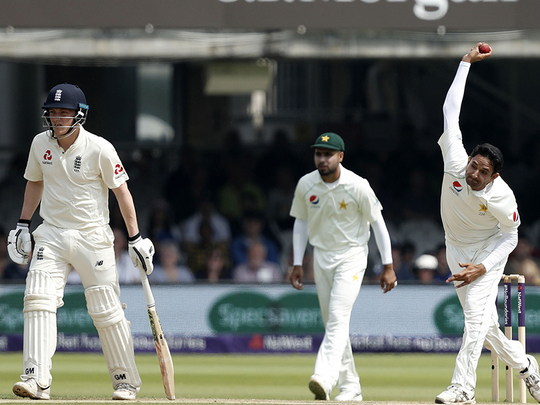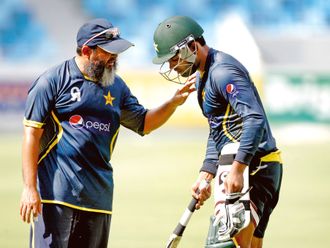
London: A decade ago, Mohammad Abbas was back at home in Pakistan, assisting lawyers in setting up lawsuits over real estate. The idea that he would one day claim the best figures by an Asian fast bowler at Lord’s would have been the stuff of fantasy.
Yet here he is in England with a historic series victory over England within reach, and a new legion of admirers queuing to pay him compliments. The days of his menial court duties — and, before that, working as a welder and in a leather factory — must seem very long ago. “My life before cricket was very challenging but those struggles helped me in cricket because when I came into the sport I had become mature enough to deal with the problems,” Abbas, 28, told The Daily Telegraph.
“After the welding and leather factory, I was an office boy in a court, registering documents for cases related to property. When I was working at the court I got selected for the district Under-19 cricket. They asked me to choose between the job or cricket. I cannot forget that night. But a friend, who was a lawyer too, made a case of doing both things together.”
If that was one sliding doors moment, the other came when he came to play in that under-19 tournament. “The team had to choose between me and the secretary’s son, and the decision was made through a toss,” he revealed. “It went in my favour and I got five wickets. After that, I got into the region’s academy and there was no stopping after that.”
Pakistan must be grateful. Last week, Abbas outsmarted England’s batsmen with high-quality seam bowling and finished the match with eight for 64. The upshot was Pakistan comfortably winning the Test by nine wickets.
Abbas’s is an unlikely story. He is a product of the Sialkot district, an area that has produced eight Test cricketers but only one fast bowler — Abbas. His village of Jatheke, a detour left off the Lahore-Sialkot highway, is notable for being the home of the mother of Mohammad Iqbal — the philosophical thinker in British India who dreamt up the idea of creating Pakistan in 1930.
Abbas outgrew his village side, and was called up by Sialkot, where he shared a dressing room with Mohammad Asif. “I played Grade II cricket for two years with Asif — we used to discuss things a lot, about how to bowl and where to bowl. I feel like I learnt bowling from him. People like him, Glenn McGrath, Shaun Pollock, James Anderson — they are my ideal bowlers. I like their lines and lengths.”
Abbas has learnt well from that gilded quartet. He has an unerring knack of placing the ball consistently in the same channel, with just enough movement off the seam to discomfort batsmen. According to CricViz, since his debut only two bowlers have bowled more than half the deliveries at a good length — South Africa’s Vernon Philander and Abbas. Akin to Philander, Abbas also loves playing with the minds of the batsmen and uses his spells to probe their weaknesses.
“I know my strengths — that’s why I try to bowl from wicket to wicket,” he said. “I try to make batsmen play the ball as much as possible. When you bowl long spells, you get to learn about the weaknesses of batsmen.”
Perhaps the most surprising aspect of Abbas’s story is that he was not summoned by Pakistan sooner. The former Pakistan captain Misbah-ul-Haq wanted him for England’s tour in 2016 but his pleas were ignored by the selectors. Only after Pakistan had a miserable tour Down Under in 2016-17, when they lost all five Tests to New Zealand and Australia, did they agree to adding him to the party travelling to the West Indies.
Abbas struck with the second ball of his Test career in Jamaica and there has been no stopping him since. His 40 wickets in seven Tests is the most by any Pakistan bowler at this stage of his career.
Abbas credits working with Azhar Mahmood, Pakistan’s bowling coach, for honing his skills and Mickey Arthur, the coach, for making the team fitter and more energetic in the field. “He is highly impressive,” he said. “He never compromises on fielding. Before every series we go through a fitness test, and by doing this we have developed a fitness culture in the country.
“I compete with myself in every match, trying to get better, trying to make us win matches. I want to be better than we were at Lord’s.” England have been warned.
— The Telegraph Group Ltd, London











